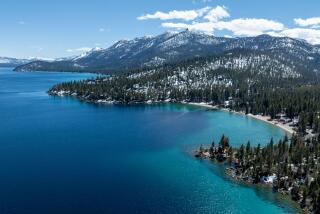Snowpack near 2-decade low
- Share via
SACRAMENTO — The water content in the Sierra snowpack is at its lowest level in nearly two decades, leading to concern that California may not be able to fulfill its water obligations to cities and farms if dry conditions persist another year.
The latest measurements were taken Wednesday near South Lake Tahoe during the fourth snow survey of the season by the state Department of Water Resources. It is considered the most important survey because state hydrologists use it to predict water supplies and deliveries for the summer months.
The water content in the snowpack along the 400-mile range averaged 46% of normal. That’s the lowest level since 1990, when it was 40% of normal.
“If you start putting dry winters together, you deplete the reservoirs,” department spokesman Don Strickland said.
State hydrologists had hoped for a wetter March to boost the snowpack. March storms typically add about 10% to 15% more snow in the Sierra.
Frank Gehrke, the department’s snow survey section chief, said the storm that passed over the Sierra on Monday boosted the snowpack by about 2 inches but wasn’t enough to recover from a dry month.
“Instead of seeing an increase of 5 or 6 inches in March, we lost 8 or 9 inches,” Gehrke said. “That’s a pretty bleak month.”
Sierra snowmelt provides more than a third of the state’s drinking and irrigation water and is the lifeblood of the State Water Project, which serves more than 23 million people and 775,000 acres of farmland.
In addition, about a quarter of the state’s power comes from hydroelectric plants that rely on heavy mountain runoff.
In the Los Angeles area, which is experiencing its lowest rainfall year on record, water managers said the region had enough in storage and from other sources to offset any potential cutbacks in state water deliveries this year.
“It’s always worrisome in a year like this, but you’re not going to see any rationing in Los Angeles,” said Jeffrey Kightlinger, executive director of the Metropolitan Water District of Southern California. “We expect it to be cyclical.”
More to Read
Sign up for Essential California
The most important California stories and recommendations in your inbox every morning.
You may occasionally receive promotional content from the Los Angeles Times.









